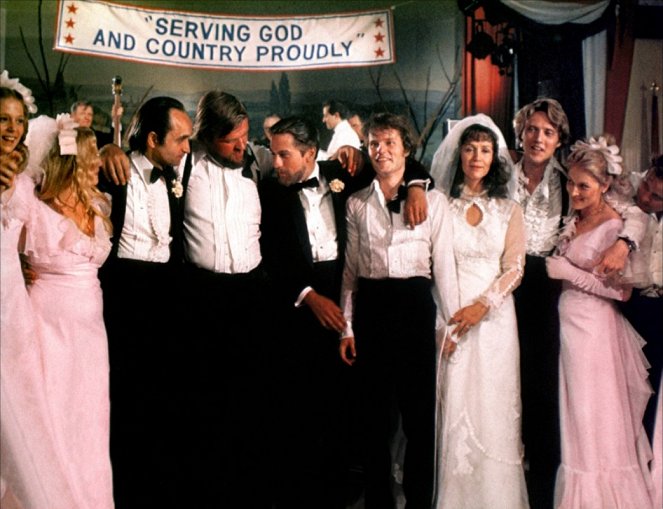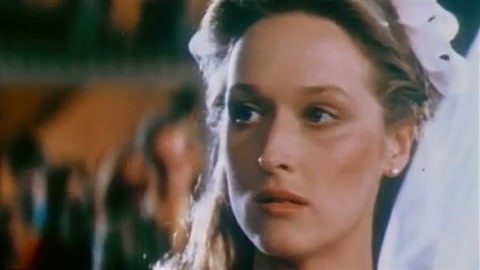Regie:
Michael CiminoDrehbuch:
Deric WashburnKamera:
Vilmos ZsigmondMusik:
Stanley MyersBesetzung:
Robert De Niro, Christopher Walken, John Savage, Meryl Streep, John Cazale, George Dzundza, Shirley Stoler, Chuck Aspegren, Rutanya Alda, Joe Grifasi (mehr)Streaming (3)
Inhalte(1)
Der Film erzählt die Geschichte einer Freundschaft von sechs jungen Männern. Als drei von ihnen 1968 ihre Einberufung nach Vietnam bekommen, bedeutet dies nicht nur Trennung, sondern vor allem auch den ersten bedeutenden Einschnitt in ihrer Entwicklung. Die Erfahrung des Krieges und der Gefangenschaft bei den Vietcong verändert die drei Freunde. Sie kehren am Ende in ihre Heimatstadt in Pennsylvania zurück: einer als Toter, einer im Rollstuhl und der Dritte zwar ohne sichtbare aber nichts desto weniger schwere psyschiche Verwundungen. (KinoweltTV)
(mehr)Videos (4)
Kritiken (6)
It doesn’t matter that he didn’t make many films and that his later works showed some stagnation, it only took three films, The Deer Hunter, Heaven’s Gate and The Year of the Dragon to make Michael Cimino one of the greatest filmmakers of the 20th century in my eyes. It's a great shame that he was later so disheartened by audience misunderstanding and financial difficulties that he lost his creative spark and withdrew into himself. Paraphrasing film critic Jaroslav Bocek in his review of Marketa Lazarová, The Deer Hunter and Heaven’s Gate are revelations, huge boulders that have grown up and suddenly moved our cinematic and aesthetic standards. Cimino's film is told slowly, in all its epic breadth, as seen, for example, in the seminal works of David Lean. The Russian roulette, which puts the lives of the main characters at stake, is a kind of metaphor for war, and one can laugh smile at Jane Fonda's misunderstanding, who accused Cimino (wrongly, of course) of racism and sucking up the system. PS: Thanks God for Blu-ray! Compared to the lame DVD edition, The Deer Hunter looks amazing in it!
()
The hell of Vietnam, which always was the main strength of films like this, is only given thirty minutes of the total runtime, but despite that, or maybe because of it, The Deer Hunter is one of the most impressive war dramas of all time. Michael Cimino was able to portray exactly what he originally wanted to portray: the futility of that conflict and the terrible impact it had on thousands of young volunteer soldiers, and that's why the Russian roulette scenes have become so famous; they are, of course, wonderfully filmed and acted, but more importantly, they are a perfect metaphor for how American society viewed the conflict. The best Vietnam War film for me remains Coppola's Apocalypse Now, but The Deer Hunter hangs firmly in second place.
()
How many American films can you recall that start with a scene in a factory and their protagonists are workers, ordinary employees earning a living with their hands? American cinema is swarming with stories of white-collar workers, lawyers, doctors, and businessmen, but it has been rather stingy in mapping the destinies of blue-collar workers. The Deer Hunter is considered one of the three most significant movies about the Vietnam War, but I always perceived it much more as one of the few films about poor white men, the current supporters of President Trump. I will probably be one of the handful of film viewers who are more interested in the first part of the film devoted to a group of friends from a foundry, how they enjoy themselves after work and celebrate the wedding of one of them. The war part actually represents only a small portion of the film, and on top of that, it is the least successful one. Including drafted soldiers from the same locality in one unit may have been a practice of the American army, but the capture of the group of friends and their joint escape already reeks of typical cinematic opportunism. I don't harbor any illusions that the Vietnamese treated their captives with kid gloves, they had no reason to, but it seems unlikely to me that they would eliminate Americans so wastefully - they represented too valuable a commodity and a propagandistic trump card. The motif of Russian roulette apparently belongs to Southeast Asia soaked with gambling, but it seems nonsensical from a psychological perspective that it would be embraced by a soldier who has just survived frontline deployment and hit rock bottom. I would understand addiction, a propensity for violence, or the inability to reintegrate into the community, but this? The motif of Russian roulette always seemed artificial and significantly disruptive to me, Nick's alienation could have been described in a more realistic way. Ultimately, what stuck with me the most from the movie were a few impressive scenes from Saigon just before the fall of the regime and the stellar cast. However, I can't say that I associate it with any exceptional viewing experience. It will also be a problem for the average viewer to deal with its length and pace, as 183 minutes is truly a big chunk. I don't perceive The Deer Hunter as a war film but rather as a drama about a generation of American men whose youth was shaped or deformed by the war in Vietnam. Overall impression: 60%.
()
Very strong finale and amazing performances from Walken and De Niro. Not so much of Vietnam, but when there is, it’s worth it. Cimino focuses on human relationships and tells a story about three friends, each of whom returns home changed by the war. The exposition is a bit too long, but not without reason. Personally, I like different slants on the Vietnam War, but The Deer Hunter is definitely worth seeing.
()
"You're just too good to be true..." It’s very hard to rate The Deer Hunter. On one hand it has acting that you don’t see every day and also there is an incredible amount of strong scenes which will leave you shaken and stay imprinted in your mind. On the other hand there is no need whatsoever for the movie to be so long. You are waiting for Godot for one hour (3/5), he comes and stays for forty minutes (5/5), but then he leaves and you start waiting again (4/5). Then just you are expecting it to end when Godot comes back for a couple of minutes (5/5). In every part you could find whole passages that are unnecessary or could be cut out here and there without any significant impact on the movie as a whole. Nevertheless The Deer Hunter belongs amongst those few rare films that are a must see.
()
Galerie (171)
Photo © Carlotta Films



Werbung